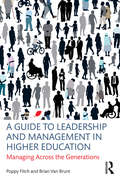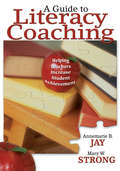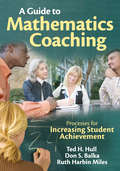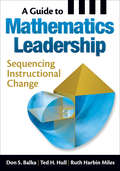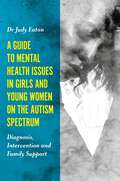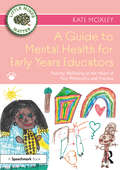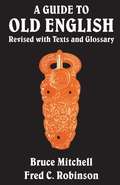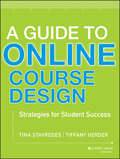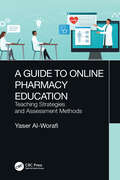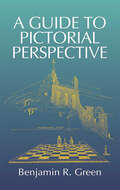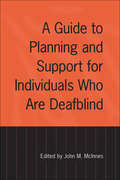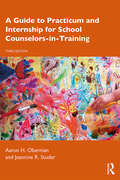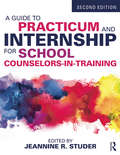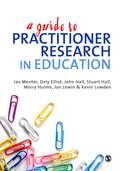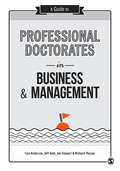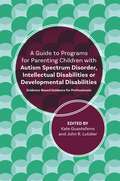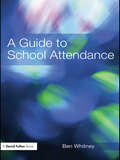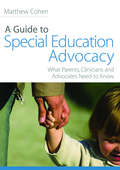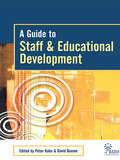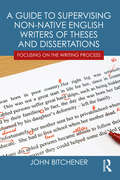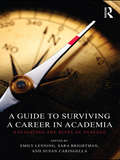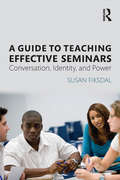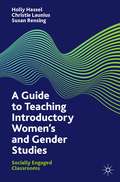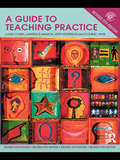- Table View
- List View
A Guide to Leadership and Management in Higher Education: Managing Across the Generations
by Brian Van Brunt Poppy FitchA Guide to Leadership and Management in Higher Education shares an innovative approach to supervision, leadership, and management in the higher education workplace. Drawing from humanism and positive psychology, Fitch and Van Brunt weave together a compelling narrative for managing employees across generational differences. This book shares key leadership lessons and advice on how to inspire creativity, increase efficiency, and tap into the talents of your diverse, multi-generational staff. This guide offers practical and detailed advice on establishing new relationships, setting expectations, encouraging accountability, addressing conflict, and supervising difficult staff. Focusing on how to build and strengthen connections through genuineness and empathic caring, this book provides important guidance for today’s college and university leaders.
A Guide to Literacy Coaching: Helping Teachers Increase Student Achievement
by Annemarie B. Jay Mary W. StrongThis practical guide presents effective coaching strategies and best practices for enhancing literacy instruction, working with administrators and communities, and boosting student performance across all grade levels.
A Guide to Mathematics Coaching: Processes for Increasing Student Achievement
by Don S. Balka Ted H. Hull Ruth Harbin MilesDiscover how effective coaching relationships add up to improved mathematics teaching and learning! Based on principles established by NCTM and NCSM, this resource outlines a coaching process for engaging math teachers and fostering productive collaborations that lead to better teaching practice and increased student achievement. Focusing on the role of the math coach in transforming mathematics classrooms and ensuring equity, the chapters help coaches: Collaborate with teachers to align and implement curriculum Build trust and rapport with hesitant or resistant teachers Develop collegial partnerships for planning, analyzing, and reflecting on instruction Support and sustain individual and institutional change
A Guide to Mathematics Leadership: Sequencing Instructional Change
by Don S. Balka Ted H. Hull Ruth Harbin MilesWritten by three noted mathematics educators, this volume presents a process-based approach to building a high-quality mathematics program based on five NCTM principles and four NCSM leadership principles.
A Guide to Mental Health Issues in Girls and Young Women on the Autism Spectrum: Diagnosis, Intervention and Family Support
by Judy EatonThis book addresses the specific mental health needs of girls and young women with autism spectrum disorder (ASD). Looking at the ways autism presents differently in girls than in boys, and the mental health conditions that occur most frequently in girls with ASD, this is the essential guide for clinicians and educators on tailoring interventions and support to meet girls' needs. Describing the current assessment process for autism diagnosis, the book explains why girls are under- or mis-diagnosed, leading to later mental health issues. It outlines the types of intervention that are particularly helpful for working with girls to reduce anxiety, improve social interaction skills, and manage self-harm. The book also covers how to manage eating disorders and feeding difficulties, focusing on working with girls with sensory processing difficulties. There is advice on how to deal with the emotional impact on parents, carers and families, and the challenges they face when negotiating appropriate psychological and educational support.
A Guide to Mental Health for Early Years Educators: Putting Wellbeing at the Heart of Your Philosophy and Practice (Little Minds Matter)
by Kate MoxleyThis practical and accessible guide tackles the challenges that busy childcare educators face with their mental health in what is a wonderful, rewarding, but often exhausting role. Drawing from "day-in-the-life" experiences and case studies, this book sets out high-quality staff wellbeing practices that can revolutionise the way childcare practitioners approach their job and their own health. Chapters guide the reader through a process of reflection and development, encouraging and empowering them to create a workplace culture that positively contributes to their personal wellbeing. This book: • Focuses on the realities of Early Years education, combining the author's lived experience with examples of real-life practice • Encourages educators to think and feel positively about themselves; to identify the individual skills, strengths and talents they bring to their work • Can be used individually or collaboratively by team members, with guidance on creating a positive workplace culture with a shared vision, core values and beliefs. Essential reading for anybody who finds that the job they love can sometimes leave them feeling worn out, stressed and depleted, this book has been written to enrich the lives of all training and practising Early Years Educators.
A Guide to Old English: Revised with Texts and Glossary (The Royal Society of Canada Special Publications)
by Bruce Mitchell Fred RobinsonA Guide to Old English has established itself as the most thorough and most stimulating introduction to the language of Anglo-Saxon England. This revised edition adds ten basic texts, together with full notes and a comprehensive glossary, which convert the Guide into a self-contained course book for students beginning a study of Old English. The texts, such as Cynewulf and Cyneheard, the story of Caedmon and the conversion of Edwin, are those that have traditionally been chosen by teachers precisely becasue they offer the best introduction to the literature and culture of the time. They are arranged in order of increasing difficulty. The notes and glossary constantly refer to the grammatical explanations in the Guide, so that course is fully integrated and easy to follow.
A Guide to Online Course Design: Strategies for Student Success
by Tina Stavredes Tiffany HerderA Guide to Online Course Design offers faculty and professional staff a practical and easy-to-follow model for creating exceptional online courses that focuses on quality standards in instructional design, transparency in learning outcomes, and learner persistence. A comprehensive resource, the book includes effective, research-based instructional strategies to motivate online learners and help them become more self-directed. A Guide to Online Course Design emphasizes quality standards and removing barriers to learners’ persistence, which ensures online courses meet the needs of online learners as well as distance education initiatives. “All faculty members and course designers, regardless of experience level, content background, or technology skills, can benefit from applying the approaches defined in this book. The authors have imparted a wealth of knowledge that can improve the quality of any online class and I highly recommend this book for all those involved with online learning.” - Anton G. Camarota, faculty, University of Denver “Anyone involved in developing online courses should read this book! Packed with great insights and the research to back them up, Stavredes and Herder guide readers with practical information that will support online course development.” - Brenda Boyd, director of professional development and consulting, Quality Matters Program “The blend of theory and application makes A Guide to Online Course Design and indispensable resource for any professional seeking to create high quality, outcomes-based learning experiences. I loved the action steps that close each chapter, as they lead the reader through the entire process of course design from analysis to implementation.” - Kathe Kacheroski, dean of curriculum and instruction, Rasmussen College
A Guide to Online Pharmacy Education: Teaching Strategies and Assessment Methods
by Yaser Al-WorafiThis book describes in detail the various teaching strategies and assessment methods used in pharmacy education. Included in the text is both the advantages and disadvantages of each teaching and assessment method, as well as tips for effective implementation of the strategies. The text covers a plethora of teaching styles, from web based and online learning to lecture and team-based learning, and highlights some of the best practices used worldwide. This book aims to be a valuable single resource for pharmacy educators, students, and researchers. Key features One resource for the pharmacy educators, students, partitioners, researchers, policy makers and other readers with the necessary information and practical guidelines about the online pharmacy education, practice, and research. Describe and discuss the situation of the online pharmacy education, practice, and research around the world. Describe the challenges facing the online pharmacy education, practice, and research and suggest recommendations to overcome the challenges. Describe the pharmacy education teaching strategies and assessment methods. Describe the advantages and disadvantages of each teaching strategy and assessment method. Provide tips for the effective implementation of teaching strategies and assessment methods based on the best practices worldwide.
A Guide to Pictorial Perspective
by Benjamin R. GreenMeeting the challenge of realistic drawing involves the application of science to an individual design sense. Here is a clear, jargon-free primer on recreating objects from nature by using perspective techniques. Author Benjamin R. Green's straightforward approach teaches artists and students at all levels how to visually rationalize the differences between form and appearance.Green begins with definitions of lines (parallel, perpendicular, inclined, horizontal, and vertical) and discussions of the seat of the eye and the vanishing point. He examines the relative situation of the spectator and the object to be drawn, compares parallel and oblique views, and discusses drawing objects with more than four sides and curved-line objects such as arches. Numerous illustrations appear throughout the text.
A Guide to Planning and Support for Individuals Who Are Deafblind
by John McinnesIn this ground-breaking collection, leading experts in the field address the problems of parents, intervenors, and professionals who work with people who have been deafblind since birth or from a very early age. Individuals who are congenitally deafblind face the same challenges as those who become deafblind later in life, but they have not had the same opportunity to develop the communications skills and a conceptual base needed to construct an understanding of the world. The contributors address identification of deafblindness, planning and intervention, development, family support, and education.Just as McInnes and Treffry's "Deafblind Infants and Children" helped to change the approach to and the perception of deafblind children, this collection will assist in fostering a new approach to the education of and support for older children, youth and adults who are deafblind. An essential part of this process is to set forth standards for program development, implementation, and evaluation, which this volume aims to accomplish. It will make an essential contribution to the expanding field of services for the deafblind population of all ages, and to the improved understanding of parents, family members, and professionals who support them.
A Guide to Practicum and Internship for School Counselors-in-Training
by Jeannine R. Studer Aaron H. ObermanThe ideal resource for school counseling field experiences, the updated and expanded third edition of A Guide to Practicum and Internship for School Counselors-in-Training covers all aspects of the practicum and internship experience from the initial contact with supervisors to detailed descriptions of students’ different roles. Readers will gain an awareness of school culture and the understanding needed to develop an individualized philosophy of school counseling. Each chapter contains activities, case studies, worksheets, and images to facilitate understanding, and all material is consistent with both the Council for Accreditation of Counseling and Related Educational Programs (CACREP) 2016 Common Core and School Counselor Entry-Level Specialty Areas and the school counselor standards identified by the American School Counselor Association (ASCA). Specific focus is given to strategies for implementing the ASCA National Model (4th edition) as a part of clinical experiences. This text can be used by faculty, students, and supervisors alike to support and enhance the school counseling knowledge base used to meet the needs of all students.
A Guide to Practicum and Internship for School Counselors-in-Training
by Jeannine R. StuderA Guide to Practicum and Internship for School Counselors-in-Training, 2nd ed, covers all aspects of the practicum and internship experience, from the initial contact with supervisors to detailed descriptions of students’ different roles. Readers will gain both an awareness of the school culture and the understanding needed to develop an individualized philosophy of school counseling. Specific topics covered include popular counseling theories used by school counselors, strategies for working with special populations of students, understanding the school counselor's role in utilizing the 2012 National Model of the American School Counselor Association (ASCA) including the inherent elements and themes, putting the ASCA ethical standards into practice, and administration of day-to-day tasks. Each chapter contains activities, case studies, worksheets, and images to facilitate understanding, and all material presented is consistent with both the accreditation standards of the Council for the Accreditation of Counseling and Related Educational Programs (CACREP) and the school counselor standards identified by the ASCA.
A Guide to Practitioner Research in Education
by Ian Menter Dely Elliot Moira Hulme Jon Lewin Kevin LowdenDrawing on short texts that were produced by the former Scottish Council for Research in Education (SCRE), Menter et al. (education, U. of Glasgow, UK), some whom have worked in the SCRE, introduce education students and experienced teachers to practitioner research. They explain what it is and what it means for teachers, lecturers, and other education professionals; why to engage in it, such as for initial teacher education, school improvement, or policy development; and its elements: the research question, values and ethics, secondary data, the literature review, questionnaires, interviewing, focus groups, observation, and other methods like using photos, diaries, and drawings. They end with explanation of quantitative and qualitative data analysis and sharing research. Annotation ©2012 Book News, Inc. , Portland, OR (booknews. com)
A Guide to Professional Doctorates in Business and Management
by Jim Stewart Lisa Anderson Professor Richard Thorpe Jeff Gold*Shortlisted in the Management and Leadership Textbook Category at CMI Management Book of the Year Awards 2017* Lecturers, request your electronic inspection copy here. Are you undertaking (or thinking of doing) a Doctor of Business Administration (DBA) or other professional doctorate (PD) in business and management? Or perhaps you’re supervising and delivering one of these programmes? This is your complete - and practical - guide to succeeding on this course. A Guide to Professional Doctorates in Business and Management has been written by a team of experts with experience of the challenges faced in both studying for and supervising professional doctorates in business and management. Inside they address the key issues faced, in particular how these courses differ from a traditional PhD, and the different skills and approach needed for success. Chapters explore the nature and importance of PDs as leading change in the professional world of practice, and how they need to differ from traditional forms of doctorate such as PhDs. The guide also offers practical guidance on researching in this particular mode, and through writing and publishing a thesis, making a valuable contribution to professional knowledge.
A Guide to Professional Doctorates in Business and Management
by Jim Stewart Lisa Anderson Professor Richard Thorpe Jeff GoldAre you undertaking (or thinking of doing) a Doctor of Business Administration (DBA) or other professional doctorate (PD) in business and management? Or perhaps you're supervising and delivering one of these programmes? This is your complete - and practical - guide to succeeding on this course. A Guide to Professional Doctorates in Business and Management has been written by a team of experts with experience of the challenges faced in both studying for and supervising professional doctorates in business and management. Inside they address the key issues faced, in particular how these courses differ from a traditional PhD, and the different skills and approach needed for success. Chapters explore the nature and importance of PDs as leading change in the professional world of practice, and how they need to differ from traditional forms of doctorate such as PhDs. The guide also offers practical guidance on researching in this particular mode, and through writing and publishing a thesis, making a valuable contribution to professional knowledge.
A Guide to Programs for Parenting Children with Autism Spectrum Disorder, Intellectual Disabilities or Developmental Disabilities: Evidence-Based Guidance for Professionals
by V. Mark Durand Susan Timmer Anthony Urquiza Katelyn M. Guastaferro John R. Lutzker Yona Lunsky Lynn Koegel Brittany Koegel Robert Koegel Shelley Clarke Julia Strauss Laura Lee McIntyre Mallory Brown Melissa A. Mello Meagan Talbott Sally Rogers Sandy Magana Wendy Machalicek Kristina Lopez Emily Iland Brandi Hawk Ronit M. Molko-Harpaz Kenneth Fung Lee Steel Kelly BryceThis book provides a comprehensive outline of the major parent training programs for parents of children with intellectual or developmental disabilities (IDD), including Autism Spectrum Disorder. Parents or primary caregivers spend the most time with a child, and training them in behaviour management and intervention strategies is critical to improving a child's behaviour, to helping them to learn new skills, and to reduce parental stress. Authored by eminent specialists in the field and written for researchers and clinicians supporting or treating families, each chapter focuses on one of the key evidence-based parent training programs - from Incredible Years® and Positive Family Intervention through to Pivotal Response Treatment and Acceptance and Commitment Therapy. Each chapter provides a breakdown that features an introduction to the model, evidence for the model, a full description of the model, a discussion of implementation and dissemination efforts, and concluding comments. Grounded in research, this definitive overview provides the evidence and guidance required for anyone considering investing in or running a parenting program.
A Guide to School Attendance
by Ben WhitneyImproving school attendance remains a contentious topic and is a high priority for the DCFS, local authorities and schools. Thousands of sessions are missed every day; a waste of money, resources and, most of all, of opportunity. A school’s practice is now subject to scrutiny as never before, with targets and standard procedures required. A Guide to School Attendance provides a detailed practical guide for school leaders and managers, teachers, Education Welfare Officers and other attendance workers in schools and local authorities. New Registration Regulations have been force since September 2006. All state-maintained schools have a legal duty to combat unauthorised absence, to maintain a twice-daily attendance record for every pupil and have attendance policies and procedures ready for OFSTED inspections. These should define everyday practice in all schools but are not always widely known about by those on the front-line. Ben Whitney draws together twenty years of education welfare experience to provide a wealth of ideas to benefit any school. The book provides: summaries of the legal requirements extended case studies Question and Answer sections group work activities model policies and procedures
A Guide to Special Education Advocacy: What Parents, Clinicians and Advocates Need to Know
by Matthew CohenDisability law can be complex and intimidating, so how can concerned parents use it to ensure their child with a disability receives the appropriate education they are legally entitled to? A Guide to Special Education Advocacy gives strategies for advocating for better provision of special education in schools. Despite the many services and accommodations that have been made for students with disabilities, such as the use of Braille or providing specialized education in a regular or special classroom, many children with disabilities do not get the services they need and are not placed in appropriate programs or settings. Because of this, the perception of disability often remains unchanged. Matthew Cohen's insightful manual gives a practical vision of how a parent or a professional can become an advocate to achieve a more inclusive and rewarding education for the child with a disability. This book will provide parents, people with disabilities, professionals and clinicians thinking about special education advocacy with an overview of current disability law and how it works, identifying practical ways for building positive and effective relationships with schools.
A Guide to Staff & Educational Development (SEDA Series)
by Peter Kahn David BaumeSystematic support for improving education and learning in further and higher education, has moved to centre stage in recent years. This is reflected in the increasing membership of professional bodies. Most new staff are encouraged to engage in staff development programmes, but receive little training to do so. This book has been written to meet this need: it is a practical handbook that introduces the key issues in staff and educational development, ideal for any education professional in the early years of their career at further or higher education level.
A Guide to Supervising Non-native English Writers of Theses and Dissertations: Focusing on the Writing Process
by John BitchenerFocused on the writing process, A Guide to Supervising Non-native English Writers of Theses and Dissertations presents approaches that can be employed by supervisors to help address the writing issues or difficulties that may emerge during the provisional and confirmation phases of the thesis/dissertation journey. Pre-writing advice and post-writing feedback that can be given to students are explained and illustrated. A growing number of students who are non-native speakers of English are enrolled in Masters and PhD programmes at universities across the world where English is the language of communication. These students often encounter difficulties when writing a thesis or dissertation in English – primarily, understanding the requirements and expectations of the new academic context and the conventions of academic writing. Designed for easy use by supervisors, this concise guide focuses specifically on the relationship between reading for and preparing to write the various part-genres or chapters; the creation of argument; making and evaluating claims, judgements and conclusions; writing coherent and cohesive text; meeting the generic and discipline-specific writing conventions; designing conference abstracts and PowerPoint presentations; and writing journal articles.
A Guide to Surviving a Career in Academia: Navigating the Rites of Passage
by Emily LenningNavigating an academic career is a complex process – to be successful requires mastering several 'rites of passage.' This comprehensive guide takes academics at all stages of their career through a journey, beginning at graduate school and ending with retirement. A Guide to Surviving a Career in Academia is written from a feminist perspective, and draws on the information offered in workshops conducted at national meetings like the American Society of Criminology and the Society for the Study of Social Problems. Through the course of the book, an expert team of authors guide you through the obstacle course of finding effective mentors during graduate school, finding a job, negotiating a salary, teaching, collaborating with practitioners, successfully publishing, earning tenure and redressing denial and, finally, retirement. This collection is a must read for all academics, but especially women just beginning their careers, who face unique challenges when navigating through these age-old rites of passage.
A Guide to Teaching Effective Seminars: Conversation, Identity, and Power
by Susan R. FiksdalA Guide to Teaching Effective Seminars provides college and university faculty with a new approach to thinking about their teaching and helps them develop a deeper understanding of conversation itself. Seminars often inspire collaborative learning and produce rich educational environments, yet even experienced faculty find these conversations can range in quality. A Guide to Teaching Effective Seminars addresses this challenge by presenting a sociolinguistic perspective on seminars and providing instructors with best practices to manage successful seminars. Grounded in research, data, and her own deep experience teaching seminars, author Susan Fiksdal reveals ways students negotiate perspectives on reading, on conversation, and on social identities and power. By giving readers an appreciation of the discourse of seminars, the book helps to undermine stereotypes about language and people, increase civility, reduce misunderstandings, and foster tolerance for new ideas and diverse ways of expressing them. This important resource is for faculty members at all levels of experience and in every discipline who want practical advice about facilitating effective seminars. Special Features: Each chapter explores a key aspect of conversation with examples from a wide range of seminars across disciplines. Transcripts from videotaped seminars showcase authentic conversations and negotiations between students. End-of-chapter best practices promote critical thinking and collaboration. A companion website features video clips of the transcripts in the book and additional resources.
A Guide to Teaching Introductory Women’s and Gender Studies: Socially Engaged Classrooms
by Christie Launius Holly Hassel Susan RensingThis book provides a practical, evidence-based guide to teaching introductory Women's and Gender Studies courses. Based on the findings of a Scholarship of Teaching and Learning project that analyzed 72 Intro students’ written work, the authors equip instructors with key principles that can help them adapt their pedagogy to a range of classroom environments. By putting student learning at the center of course design, the authors invite readers to reflect on their own investments in and goals for the introductory course. The book also draws on the authors’ combined decades of teaching experience, and aims to help instructors anticipate the emotional, intellectual, and interpersonal challenges and rewards of teaching and learning in the introductory WGS course. Chapters focus on course design, including identifying desired learning outcomes (in terms of course content, skills, and dispositions or habits of mind); choosing course materials; pedagogical activities; and assessing student learning. This book will be an invaluable resource for experienced WGS instructors and those seeking or planning to teach it for the first time, including graduate students and high school teachers.
A Guide to Teaching Practice: 5th Edition
by Dominic Wyse Louis Cohen Lawrence Manion Keith MorrisonA Guide to Teaching Practice is the major standard text for all students on initial teacher training courses in the UK.Authoritative yet accessible, it covers the important basic skills and issues that students need to consider during their practice, such as planning, classroom organization, behaviour management and assessment. The book's focus on the quality of teaching and learning and consideration of the latest regulations and guidelines ensures that it fits comfortably within TTA and OfSTED frameworks.In addition, comprehensively revised and fully updated, this fifth edition features brand new chapters on the foundation stage, legal issues, learning and teaching and using ICT in the classroom, as well as new material on numeracy, literacy, children's rights, progress files and gifted and talented children.This book is the most respected and widely used textbook for initial teacher training courses and will be an essential resource for any student teacher.
